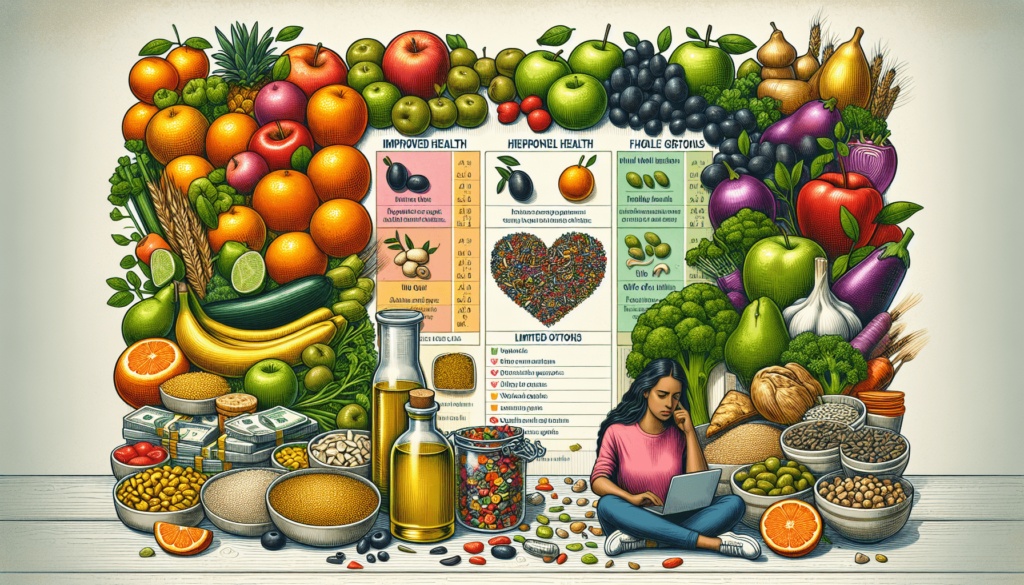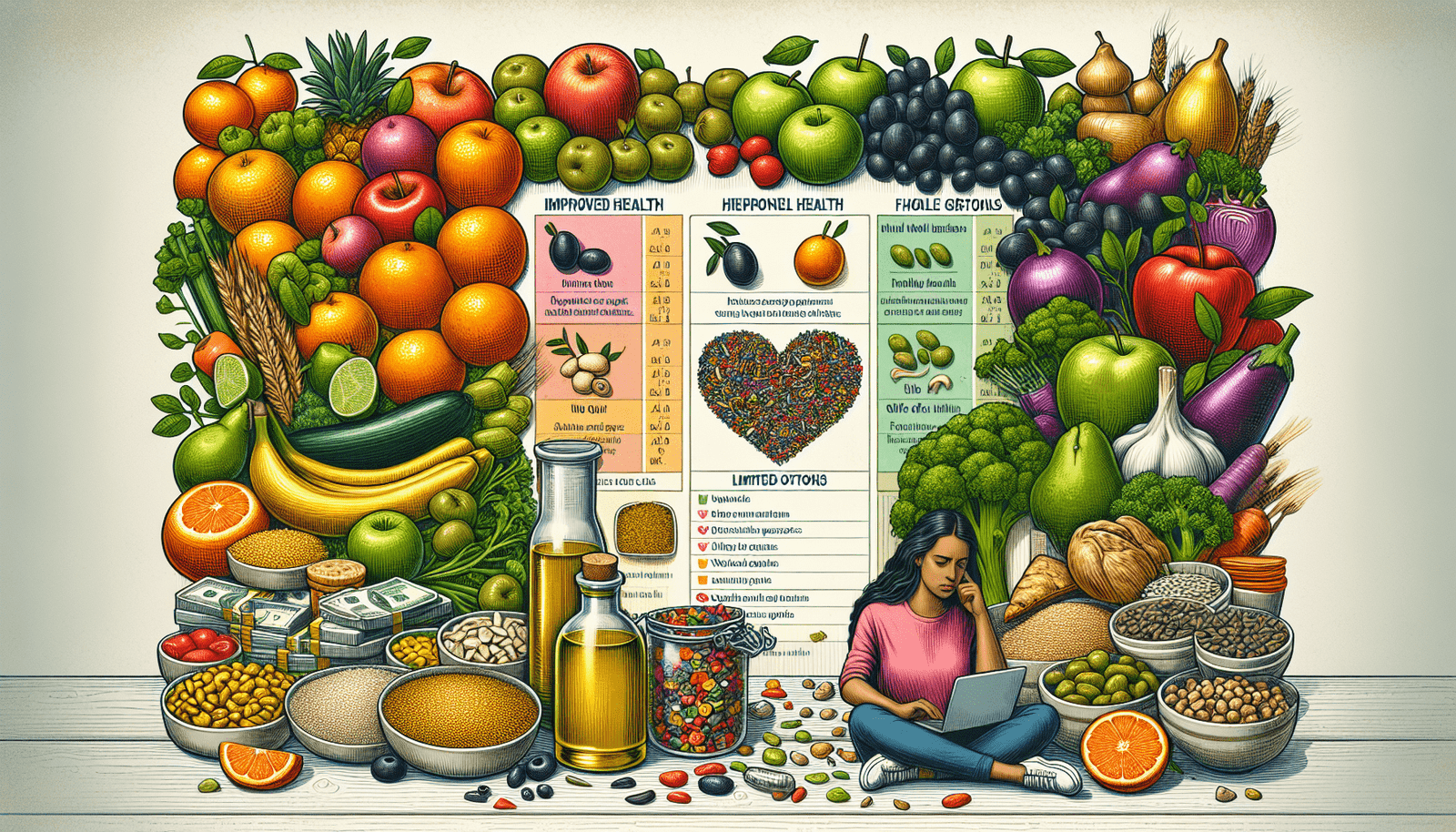Lured by its promises of improved heart health and weight loss, you’ve probably heard of the Mediterranean Diet. But before you stock up on olive oil and feta cheese, it’s crucial to understand the pros and cons that come with this popular eating plan. From its emphasis on fresh produce and lean proteins to its potential challenges in terms of budget and cultural adaptation, this article will offer you a comprehensive overview of the Mediterranean Diet, enabling you to make an informed decision about whether it’s the right fit for you.

Pros
1. Health Benefits
The Mediterranean diet is renowned for its numerous health benefits, making it an ideal choice for improving overall well-being. This diet emphasizes the consumption of whole, unprocessed foods such as fruits, vegetables, whole grains, legumes, nuts, olive oil, and lean proteins. These foods are packed with vitamins, minerals, antioxidants, and fiber, which promote good health and a strong immune system.
2. Heart Health
One of the greatest advantages of the Mediterranean diet is its positive impact on heart health. The diet encourages the intake of monounsaturated fats found in olive oil and nuts, which are known to reduce bad cholesterol levels and decrease the risk of heart disease. Additionally, the high consumption of fruits, vegetables, and whole grains provides a rich source of antioxidants that protect against the hardening of arteries, reducing the likelihood of heart attacks and strokes.
3. Weight Loss
If you are looking to shed a few pounds, the Mediterranean diet can be your ally. This dietary pattern is not characterized by strict calorie counting or portion control, but rather focuses on consuming nutrient-dense foods that keep you feeling fuller for longer periods. The diet promotes a balanced combination of lean protein, fiber, and healthy fats, which help regulate appetite and prevent overeating. Moreover, the inclusion of physical activity, another vital component of this lifestyle, aids weight loss efforts.
4. Reduced Risk of Chronic Diseases
One of the remarkable benefits of the Mediterranean diet is its potential to reduce the risk of various chronic diseases. Numerous studies have shown that this dietary pattern has a protective effect against conditions like type 2 diabetes, certain cancers, and neurodegenerative diseases such as Alzheimer’s and Parkinson’s. The abundance of plant-based foods and antioxidants in the Mediterranean diet contribute to these protective effects, emphasizing the importance of a nutrient-rich diet.
5. Nutrient Rich
The Mediterranean diet is packed with essential nutrients necessary for optimal health. It emphasizes the consumption of a wide variety of colorful fruits and vegetables, offering an array of vitamins, minerals, and antioxidants that support various bodily functions. Furthermore, the inclusion of whole grains, legumes, and lean proteins ensures a complete and well-rounded nutrient intake. In particular, omega-3 fatty acids found in fatty fish like salmon and sardines are abundant in the Mediterranean diet, providing a host of benefits such as improved brain function and reduced inflammation.
Cons
1. Cost
While the Mediterranean diet offers numerous health benefits, it can be more expensive compared to other dietary patterns. The emphasis on fresh, whole foods means that you may need to spend more on groceries, especially if you don’t have easy access to affordable produce or quality ingredients. Additionally, the inclusion of certain Mediterranean staples like olive oil and nuts, although healthful, can also contribute to the overall cost of following this diet.
2. Limited Food Choices
The Mediterranean diet primarily focuses on foods traditionally consumed in countries bordering the Mediterranean Sea. While this offers a rich and diverse array of options, it may feel restrictive for individuals who are accustomed to a more varied diet. If you have specific cultural or dietary preferences that do not align with the Mediterranean eating pattern, you may find yourself feeling limited in your food choices. However, with some creativity and adaptability, it is still possible to tailor the Mediterranean diet to suit individual tastes.
3. Preparation Time
One potential downside of the Mediterranean diet is that it may require more time and effort in the kitchen. Since this eating pattern emphasizes homemade meals using fresh ingredients, the preparation and cooking of meals can be time-consuming, particularly if you have a busy lifestyle or limited culinary skills. However, with proper planning, meal prepping, and the use of time-saving techniques, such as batch cooking, these challenges can be overcome, ensuring that following the Mediterranean diet is manageable even for those with a hectic schedule.
4. Difficulty in Adherence
Changing eating habits and adopting a new dietary pattern can be challenging, and the Mediterranean diet is no exception. It may take time to adjust to the new way of eating, especially if you are accustomed to processed or convenience foods. Resisting the temptation of unhealthy snacks or sugary treats might require some willpower in the initial stages. However, with perseverance and a positive mindset, the Mediterranean diet can become a sustainable and enjoyable lifestyle change.
5. Potential Nutrient Deficiencies
While the Mediterranean diet offers a diverse range of nutrients, there is a possibility of certain nutrient deficiencies if the diet is not well-balanced or properly planned. For example, individuals who follow a strictly plant-based Mediterranean diet may need to pay attention to their intake of vitamin B12, which is primarily found in animal products. Furthermore, individuals with specific dietary restrictions or medical conditions should consult with a healthcare professional or registered dietitian to ensure they are meeting all their nutrient needs.
In conclusion, the Mediterranean diet is a highly beneficial eating pattern that offers a multitude of health advantages. Its emphasis on whole, unprocessed foods and the inclusion of healthy fats, lean proteins, and an abundance of fruits and vegetables make it a well-rounded and nutrient-rich option for improving overall well-being. While there are some potential drawbacks like cost, limited food choices, preparation time, adherence difficulties, and the need for careful nutrient planning, these challenges can be overcome with proper planning, creativity, and support. Ultimately, the Mediterranean diet can be a delicious and sustainable way to achieve better health and optimal nutrition.


